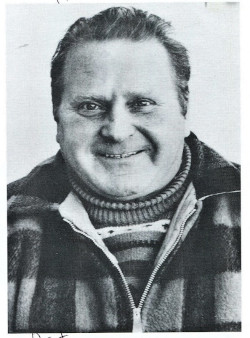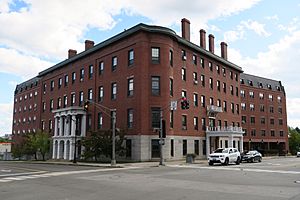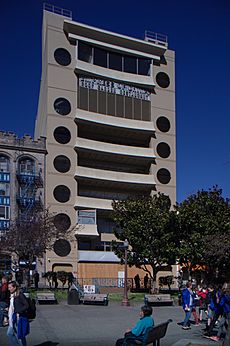Erwin Kreuz facts for kids
Quick facts for kids
Erwin Kreuz
|
|
|---|---|
 |
|
| Born | October 23, 1927 |
| Died | 2010 (aged 82–83) Peiting, Bavaria
|
| Nationality | German |
| Occupation | brewery worker |
| Known for | Mistaking Bangor, Maine for San Francisco, California |
Erwin Kreuz (1927 – 2010) was a man from Germany who became famous in the late 1970s. He was a tourist visiting the United States. His story became well-known because he accidentally went to the wrong city. He thought he had arrived in San Francisco, California, but he was actually in Bangor, Maine.
This mix-up made Kreuz a memorable person. His adventure is still shared today. It's a funny and unusual example of someone not reaching their planned travel spot.
Contents
Erwin Kreuz's First Trip to America
Erwin Kreuz was born in 1927 and lived in Bavaria, Germany. He worked at a brewery. In 1977, he decided to take a big trip to the United States. He wanted to visit San Francisco.
Kreuz spoke no English at all. He had only flown once before, to Berlin. This trip to America was his first time traveling internationally, except for a short day-trip to Switzerland. On October 3, 1977, he boarded a World Airways plane from Germany.
The Big Mix-Up in Bangor, Maine

The airplane made a stop at Bangor International Airport in Maine. This stop was for refueling. Passengers also had to go through customs and immigration. After that, they would get back on the plane.
Erwin Kreuz was half asleep during this stop. A flight attendant told him to enjoy his visit to San Francisco. She was finishing her shift and leaving the plane. Kreuz mistakenly thought he had reached his destination. He got off the plane.
He then took a taxi into the city of Bangor. He asked the driver for "sleep." The taxi took him to the Bangor House hotel. He checked into a room there.
Searching for San Francisco Landmarks
For four days, Kreuz looked for famous San Francisco sights. He hoped to see the Golden Gate Bridge. But he couldn't find any of the landmarks he expected.
The only thing that seemed familiar were two Chinese restaurants. He ate at one, knowing San Francisco had a famous Chinatown. He thought he was in a quiet part of San Francisco.
He started to realize his mistake when he had to leave his hotel room. The hotel was fully booked for a university event. Later, a taxi driver helped him understand. When Kreuz asked to go to San Francisco, the driver told him it was about 6,000 kilometers away.
Help from New Friends in Maine
A friend of Gertrude and Kenneth Romine heard Kreuz. He was asking for directions to San Francisco in a Bangor pub. The friend knew the Romines spoke German. So, he contacted them on October 14.
The Romines took Kreuz to a German-American restaurant they owned. Gertrude was the first to hear his full story. She helped him understand exactly where he was. The Romines and their son, Ralph Coffman, found him a new hotel room. They also became his hosts.
His story was first reported by local newspapers on October 20. Soon, it became a national news story.
Erwin Kreuz Becomes a Celebrity
Kreuz's story was shared by many news outlets. Time magazine, the Associated Press, and NBC's Today Show all reported on him. On the Today Show, host Tom Brokaw praised the people of Bangor for being so kind. The CBS Evening News even showed segments about Kreuz for two nights. German magazines like Stern and Der Spiegel also told his story.

People in San Francisco were also amused by his story. The San Francisco Examiner newspaper decided to fly Kreuz and Ralph Coffman to San Francisco. They arrived on October 28. There, Kreuz received even more celebrity treatment.
When he arrived, Kreuz wasn't very impressed with San Francisco. He noticed there weren't many trees on the way from the airport. Mayor George Moscone gave him the key to the city. Kreuz was also honored in Chinatown. He was welcomed into the Wong Family Association at a banquet. He even received a standing ovation at the Grand National Rodeo. There, he was given a white cowboy hat. In Maine, he had received a Native American head-dress.
Kreuz had a good sense of humor about the whole situation. When he finally flew back to Germany on October 31, he posed with a funny luggage tag. It said, "Please, let me off in Frankfurt." When he arrived in Frankfurt, Kreuz said he liked Maine more than San Francisco. He also famously said, "If Kennedy can say 'I am a Berliner,' then I am a Bangor."
Later Visits to Bangor
Second Trip to Bangor in 1978
Kreuz returned to Bangor about a year later. This visit was sponsored by a life insurance company. He stayed for a month. On October 5, 1978, he helped open the new Bangor Mall. It was the first shopping mall he had ever seen.
His flight arrived in Logan International Airport in Boston on September 25. The Romines met him there. He toured Boston before heading to Bangor. This trip further cemented Kreuz's celebrity status. Thousands of people came to see him. The mall also received a lot of publicity.
Losing His Job After Becoming Famous
However, Kreuz's fame also had a downside. The German brewery he worked for tried to use his story for their own advertising. But they were unhappy when Kreuz asked for more money than his regular salary.
He also made a comment to the German press. He said he sometimes drank a different brand of beer. This was because of how beer was distributed in his area. His month-long absence to promote an American mall was likely the final issue. He was fired from his job in November 1978, shortly after returning home. He had worked there for nine and a half years.
Third Trip to Bangor in 1979
Kreuz returned to Bangor a third and final time from February 24 to March 17, 1979. This time, he paid for the trip himself. There was also much less public attention.
He hoped to use his fame to find a job and move to the U.S. But the only job offer he received was a minimum wage cleaning position at the Bangor Mall. Before flying back to Germany, he spoke to the Bangor Daily News. He said he wasn't upset. He was thankful for the job offer and the kindness of strangers. But he admitted that this third trip had been a mistake.
He never returned to the U.S. after that. But as of 1984, he was still paying the yearly property tax on a small piece of land he owned in northern Maine.
Erwin Kreuz's Last Days
A German journalist named Sebastian Dalkowski looked into Erwin Kreuz's later life. After returning from America, Erwin Kreuz continued to live alone in Adelsried. He never married.
In his final years, he lived in a nursing home in Peiting, Bavaria. His nurse shared a touching detail. She said he often looked at a photo album from his time in Bangor. Even with his dementia, these photos kept him happy and awake. Erwin Kreuz passed away in 2010 at the age of 83.
Erwin Kreuz's Story as Travel Folklore
Erwin Kreuz's story continued to be told for many years. It became a part of not just Maine's local stories, but also modern air travel folklore. His adventure has been shared in books like Bill Harris's Landscapes of America, vol.2 (1987). It was also used by Gail Fine in her 1999 philosophy book.
The story even inspired a short story called "Looking for the Golden Gate." This was written by Barbara Sjoholm.
The Washington Post newspaper brought up Kreuz's story again. This happened when Yusuf Islam (the singer formerly known as Cat Stevens) was sent to Bangor by mistake after the September 11 attacks. Kreuz's story was also included in the Frommer's Maine Coast travel guide as late as 2009. A former New York Times reporter, Blake Fleetwood, wrote about the Kreuz incident in 2007. He said that travel mistakes like Kreuz's were more common than people realized.
Erwin Kreuz is also the subject of a song. It's a ballad recorded by Maine folksinger Wendell Austin.
Images for kids
 | Dorothy Vaughan |
 | Charles Henry Turner |
 | Hildrus Poindexter |
 | Henry Cecil McBay |




